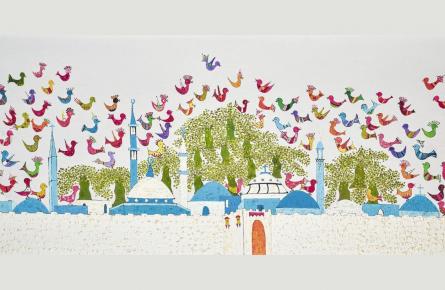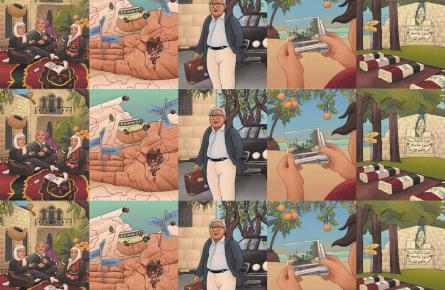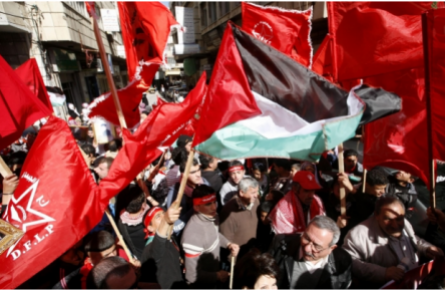Palestine Square recently interviewed Le Trio Joubran, three Palestinian brothers, Samir, Wissam, and Adnan, who are renowned for their ‘oud performances. The ‘oud, an age-old Middle Eastern instrument (which give birth to the Western lute via 8th century Andalusian Spain), has figured quiet prominently in contemporary Palestinian culture in no small part thanks to siblings who excelled at crafting ‘ouds and becoming exceptional oudmen, such as brothers Najib and Simon Shaheen and the Joubran family. In one way, the instrument has also been intertwined with the Palestinian national cause through the many venerable songs performed by Lebanese oudman Marcel Khalifa, who adopted and lyricized the poetry of the doyen of Palestinian poets, the late Mahmoud Darwish. Le Trio Joubran started performing together in 2004 and in the years since have attracted an international audience, and they may soon tour the United States as well.
Your music is incredibly affecting even for those unfamiliar with the ‘oud. Many of those reading and listening may want to learn more about the instrument. For the unacquainted, could you tell us a little about the history of the ‘oud, its centrality as a musical instrument in Palestine, and what distinguishes it from other instruments?
Wissam
The history of the ‘oud is five thousand years old. It is descended from the ancient lyre or harp that had several strings, each of which played one single note.
Westerners have used the ‘oud since its emergence during the Andalusian period (8th-15th century), which was the golden era of this instrument. The ‘oud gave birth to many other stringed instruments, including the buzuq and the cümbüş. Its history as well as its rich sonorities favored its assimilation of many musical cultures both Arab and non-Arab, which explains the multiplicity of “languages” that the instrument can express. (The western lute—a word derived from the Arabic, al-‘oud—is prevalent in pre-Baroque medieval music and a form of the ‘oud is also played in Greece and Turkey, for example.)
What is certain is that the emergence of the ‘oud brought about a new and important stage in the history of music and instrument-making. Because it was small and light, it quickly became the string instrument with multiple sonorities par excellence. It is considered to be the father of all Arabic string instruments and has preeminent position in the traditional eastern orchestra ensemble or takht, often accompanying singers and musicians.
More recently, it has become a solo instrument capable of occupying the stage alone. Its wealth of sounds has driven scientists, researchers, and musicologists to search relentlessly for theories about its origins. Some assert it originated in Persia, others in Egypt, or in Mesopotamia. Today, the most likely hypothesis is that it developed in ancient Iraq, during the Akkadian empire (2350-2170 B.C.).
As to the question of the ‘oud in Palestine, I can relate that history within our own family, going back four generations. It started around 1897 with Dib Joubran who was an ‘oud maker or luthier in Nazareth; he was followed by his son, Bassem Joubran, both a luthier and a brilliant ‘oud player, who played wedding parties and political events. Bassem didn’t have the opportunity to have an international career because of his political involvement against the Zionists under the British Mandate (1923-1948).
Some musicians, among them Rohi al-Khammash and Riad al-Bandak, were able to escape from the restrictions of the British Mandate and left Palestine to pursue their musical education. Prior to 1948, al- Khammash and al-Bandak performed on Mandate Palestine’s radio station, the Palestine Broadcasting Service in Jerusalem. The former eventually left Palestine to teach at the Baghdad music conservatory and the latter went to Damascus where he continued to perform for the radio station there.
During the Mandate years, the ‘oud was the main instrument used in composition, whether instrumental melodies or music for songs.
After a solo career, what convinced Samir to play alongside Wissam and, later on, Adnan when Le Trio made its debut in 2004? How did the chemistry initially work and (this part is for Samir) was it difficult to adjust to playing with two other artists?
Samir
After releasing two solo albums I had an opportunity to invite my brother Wissam to play on stage with me. That was in 1996 in Paris. We got very positive feedback from the audience and other music professionals who attended the concert. The main attraction was this chemistry that few other musicians beside brothers have. The harmony in our music is the result of feelings of mutual respect plus the fact that we’ve grown up in a very special atmosphere, rich with musical education.
Wissam and I produced an album called “Tamaas” (which means proximity or adjacence in Arabic), where you can feel this relationship between two musicians who are, moreover, brothers. Following the album’s release, we toured all over the world for 2 years.
During this period, Adnan was practicing the ‘oud and trying to reach a certain level of mastery. Initially, it wasn’t easy for the three of us to mesh or be on the same wavelength, maybe due to the differences in age and also, perhaps, because of our different experience performing on stage. But I really believed that this could be a success story and we all fought for it. And here we are today, 11 years later, with several albums released, and looking to compose music that can reach everyone while always remaining who we are.
Traditionally, Arabic music is created through improvisation, akin to jazz. Notation in Arabic music is a relatively recent phenomenon dating no further back than the 19th century and was the result of Western influence on the Arabic arts. Does your music adhere to the traditional ways of improvisation and experimentation or do you write scores? Or at different times do both?
Adnan
We never write our scores. Scoring/Notation is a symbolic language that enables one to share the music with others, but traditionally, in Arabic music, notation is not used either to create or play music. Moreover, we are three brothers, we know one another well and understand one another; collectively, we have three memories, so we almost never forget a phrase or something that one of us might have created. Furthermore, notation can limit the player in terms of the feelings he can express while playing or performing, and if it’s just an aid to help us as we create the music, we have a better tool, which is recording. By recording, we can easily feel and hear what we each want to say and decide accordingly.
New melodies come about in many ways. Sometimes, it’s a more deliberate process, one that is intentional, and at others it just happens all of a sudden, and it’s a more open-ended and collaborative process. Loads of ideas come to us when we are simply seated next to each other, and the “strongest” is the one who is able to hold his idea until the moment when it is ripe or the one whose idea can affect the others. We do, of course, each have time for ourselves, time in which to work on our own creative ideas, but we elaborate them once the three of us are together.
Your father is a luthier while your mother is a vocalist. What influence have your parents had on your own coming of age as artists?
Adnan
Simply, life sometimes decides for you! It was an easier choice, or it seemed more obvious, to become an “’oudist” than a doctor. We come from an artistic family of more than four generations, it’s in our DNA. How I wish I could’ve tried to become a cinema director or painter, or physician! But the ‘oud is a way of life and it is for me something I can easily express myself with.
Aside from your parents, what other artists have had a big influence on you?
Wissam
Many! During our childhood we were brought up listening to all the legendary classics, both Eastern and Western. Nowadays each one of us has his own influences. We span the gamut from Jazz to Classical, from Modern to Traditional, from Flamenco to Indian.
Your pieces are devoid of lyrics, why have your chosen to keep them strictly instrumental?
Samir
As ‘oud players and composers our focus is on the instrument itself. It’s the ‘oud’s career, if you will, as much as it is our own as performers. It’s been more than 10 years since we began touring with our instrumental music. We want to encourage instrumental music and our wish is for it to gain in popularity.
There is often an expectation that Palestinian artists convey a particularly Palestinian nationalist narrative with their art. How do you relate to that?
Adnan
We ARE Palestinians. And, as artists, holding our instruments and speaking to the world the language of culture and hope, we go from being victimized to being ordinary musicians, always in search of perfection that is unrelated to politics.
But nowadays, I believe every human being should be saying WE ARE ALL PALESTINIANS and should relate to a human cause before creating art. This cause should be supported because it’s no longer about a flag or a nation but about being against occupation! I totally agree that it can be unfair to be an artist from Palestine because being known as a Palestinian artist often imposes a specific political identity on the art, whether it’s a certain quality or just mere perception! Our aim as Le Trio Joubran is to be great musicians, and this way we can proudly represent Palestine. This is how we support our cause.
You’re from Nazareth and thus I assume Palestinian citizens of Israel. Have you performed before Israeli Jewish audiences and if so what has been the reception? Or is the experience confined to the Palestinian community in Israel?
Wissam
We’ve performed in Palestine ‘48 cities like Nazareth, Haifa, and Jerusalem. We met with some Israeli Jews who attended our concerts but we have not played events organized by Israeli producers, nor will we do so long as the occupation continues.
A concert of ours in Nazareth was prohibited by the Israeli authorities ostensibly for “security reasons,” because it was organized under the banner of “Jerusalem, Capital of Arab Culture.”
One last question: are you planning a tour in the United States anytime soon?
Adnan
We are working on it … there’s nothing planned yet, but we may be doing a Latin American tour before the end of the year, so maybe we will drop by!
To learn more about Le Trio Joubran visit their website.
Read about the history of the Palestine Broadcasting Service in Jerusalem Quarterly.
Quality journalism on Palestine requires investment. If you enjoyed this interview, please consider a tax-deductible donation to the Institute for Palestine Studies, a non-profit 501(c)3 organization.







